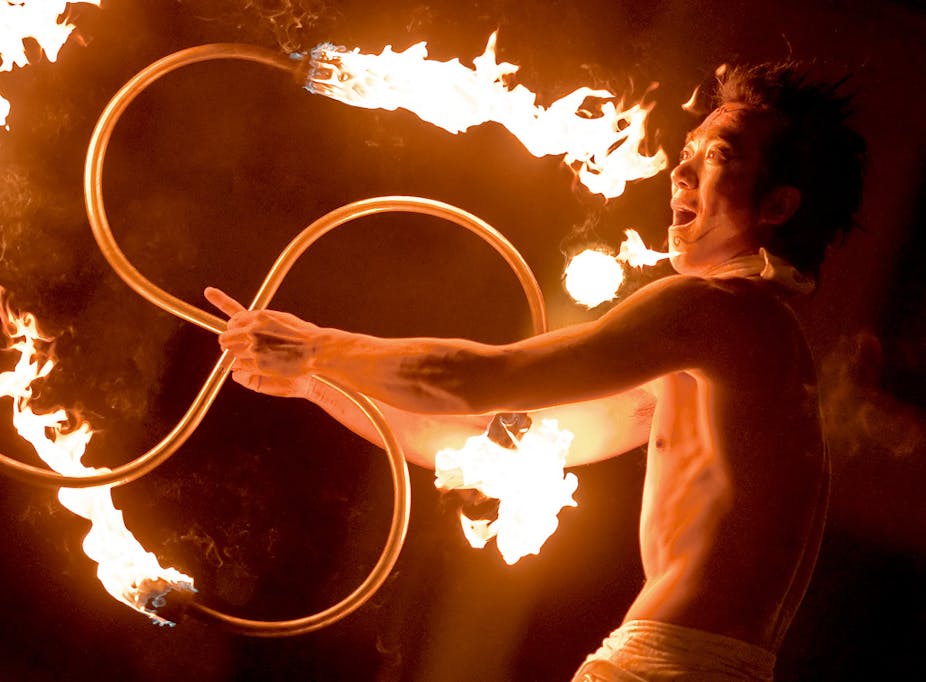We have been fascinated and repelled by fire for millennia. It’s the defining feature of humanity and it has powered all cultures.
But our relationship with this fundamental element, whether wild or contained, is changing with our planet.
The intellectual gulf between fire and human life has been entrenched in urban environments because fire has become hidden.
Now it’s contained in machines such as coal-fired power stations and internal combustion engines, not – for the majority of us – out in the open.
So landscape fires are routinely represented in the media and popular culture as “disasters”, even though the vast majority don’t directly threaten human life or property, and are integral to the functioning of many ecosystems.
A brief history of flames
Fire is an ancient phenomenon that developed shortly after plants colonised the surface of the Earth more than 400 million years ago.
Indeed, human evolution is closely coupled with the mastery of fire that led to the development of cooking, and the capacity to transform landscapes. Humans have developed a remarkable diversity of uses of fire.
The intertwined relationships between humans, landscapes and fire throughout our history blur any distinction between “natural” and human-set fires in nearly every ecosystem on Earth.
But understanding the relative influences of climate, human ignition sources and cultural practices in particular environments is critical to design sustainable fire management to protect human health, property and ecosystems.

Four ways to burn
I have been leading a transdisciplinary research team at the National Centre for Ecological Analysis and Synthesis (NCEAS) at the University of Santa Barbara, California to understand fire in the Earth System.
We have just developed a framework to help researchers and managers think about the relationships humans have with fire.
We recognise four “fire phases”:
Natural fires that occur regardless of humans
Tame fire used by hunter-gatherers to manage landscapes for game and wild food production
Agricultural fire used to clear land, grow food and burn fallow
Industrial fire to power modern societies, which has switched from using living to fossilised plants as the primary fuel.
All these phases occur on Earth today.
Flammable planet
The roll-call of nations affected by fire is stunning: Greece, Israel, USA, Russia, China, Britain, Argentina, South Africa, Brazil and so on.
Indeed, disastrous fires have occurred on every vegetated continent.
The extreme 2009 Black Saturday bushfires in Victoria that followed record-breaking temperatures on the back of a prolonged drought were consistent with predictions of extreme bushfire conditions under global warming.
The excessive combustion of fossil fuels driving climate change may completely overwhelm human capacities to control fire.
This could lead to a dangerous feedback as more burning releases more carbon into the atmosphere, further driving climate change.
More frequent fires favour plants that are more tolerant of fire, which compounds the feedback cycle.
And humans have made this situation worse by liberally spreading highly productive and flammable plants (such as robust grasses and eucalypts) around the world. This may create a truly vicious fire cycle.
Winning any sort of “war” on wild fire would seem impossible, so industrialised civilisation must now relearn how to live with flammable landscapes.

Applied research can at best only guide and evaluate major interventions, such as the current plan to burn around 5% of Victorian public wildlands to reduce the intensity of fires.
Managing flammable landscapes is one of the big climate change adaptation challenges, equal to the challenge of sea level rise to the coastal environments.
In both cases there are a lot of people residing in very vulnerable settings. Adaptation will be costly and politically painful.
One of the few recommendations of the Victorian Bushfire Royal Commission that was not accepted was the government buyback of properties at high risk of fire.
There can be no doubt our future will be shaped by fire, just as our past has been.
That is the fate of the sole “fire creature” who lives on a flammable planet.
It’s just as the myth of Prometheus foretold.

